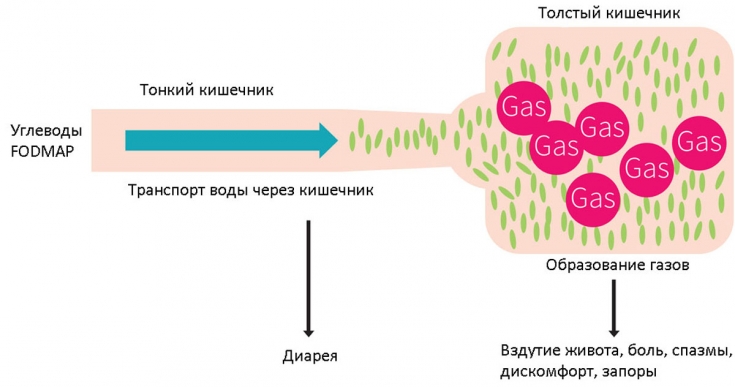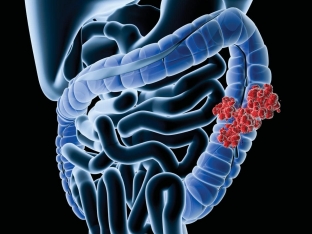Irritable bowel syndrome is one of the most commonly diagnosed pathologies in gastroenterology. The clinical picture of the disease is characterized by symptoms of intestinal damage: abdominal pain, flatulence, diarrhea and constipation.
In some cases, the pathological process is so pronounced that the patient may partially or completely lose his ability to work. At the same time, in the process of diagnosing the disease, organic lesions of the intestine are not detected.
Diagnosis and treatment of irritable bowel syndrome are quite complex, but relevant issues today, as the disease significantly impairs the quality of life of patients.
Diagnosis and treatment of irritable bowel syndrome
Irritable Bowel Syndrome is a diagnosis of exclusion. When completely non-specific symptoms of pathology appear, doctors begin to look for an organic lesion, conducting many studies, and only after excluding all other diseases of the gastrointestinal tract, the patient is diagnosed with irritable bowel syndrome.

The question of the treatment of pathology is very difficult, because the main etiological factor of the disease is a violation of the central nervous system. However, it cannot be said that patients with such a diagnosis are incurable. Treatment of irritable bowel syndrome, with the right integrated approach, can return the patient to their usual way of life.
learn more: Ideal Diet for Irritable Bowel Syndrome
Treatment of irritable bowel syndrome
- methods for diagnosing irritable bowel syndrome;
- diet therapy in the treatment of irritable bowel syndrome;
- drug treatment of irritable bowel syndrome.
Methods for diagnosing irritable bowel syndrome
Today, for the diagnosis of irritable bowel syndrome, there are Roman criteria that can be used to confirm the diagnosis as accurately as possible. Irritable Bowel Syndrome is defined if at least 3 months in the last 6 months the patient has had abdominal pain or discomfort in combination with symptoms.

Which symptoms to watch out for
1. Improvement of the patient's condition after defecation;
2. The onset of the disease coincides with a change in stool frequency;
3. The onset of the disease coincides with a change in the shape of the stool.
Learn more: Irritable Bowel Syndrome - when the stomach hurts due to stress
The diagnosis of irritable bowel syndrome is also confirmed if the following signs of pathology bother the patient for at least 25% of the day:
- the act of defecation occurs less than 3 times a week or more than 3 times a day;
- there is a change in the consistency of feces;
- defecation is disturbed: the patient strains too much, experiences a feeling of incomplete emptying of the intestine or a sudden urge to defecate;
- mucus is excreted along with feces during bowel movements;
- there is bloating and flatulence;
- there is a feeling of fullness and rumbling in the stomach.

Diet therapy in the treatment of irritable bowel syndrome
The basis of the treatment of irritable bowel syndrome is, first of all, the normalization of the psycho-emotional state of the patient. The realization that the problem lies in excessive stress and the wrong attitude towards one's condition is the key to effective treatment of pathology.
That is why it is very important to establish a trusting relationship between the patient and the doctor. Patients are encouraged to keep a diary of their symptoms for several weeks, indicating possible stressors that preceded their onset.
Diet therapy also plays an important role in the treatment of irritable bowel syndrome
1. With the predominance of diarrhea, the patient is recommended to limit the intake of coarse dietary fibers and completely exclude from the diet fructose, alcohol and coffee, carbonated drinks and all products that can increase gas formation;
2. If constipation predominates, a diet high in bran products and vegetable fiber is recommended, which helps to improve intestinal motility.

Drug treatment of irritable bowel syndrome
The effectiveness of medications in the treatment of irritable bowel syndrome is not proven, since in almost 70% of cases there is a high placebo effect. Based on this, drugs can be recommended in order to normalize the functioning of the patient's nervous system.
Drug therapy for irritable bowel syndrome is also aimed at alleviating the symptoms of the disease. If the clinical picture of the pathology is dominated by diarrhea, the patient is prescribed antidiarrheal drugs.
In case of constipation, dietary fiber is recommended and laxatives. The appointment of antispasmodics is necessary to eliminate pain in patients with irritable bowel syndrome.







Add a comment